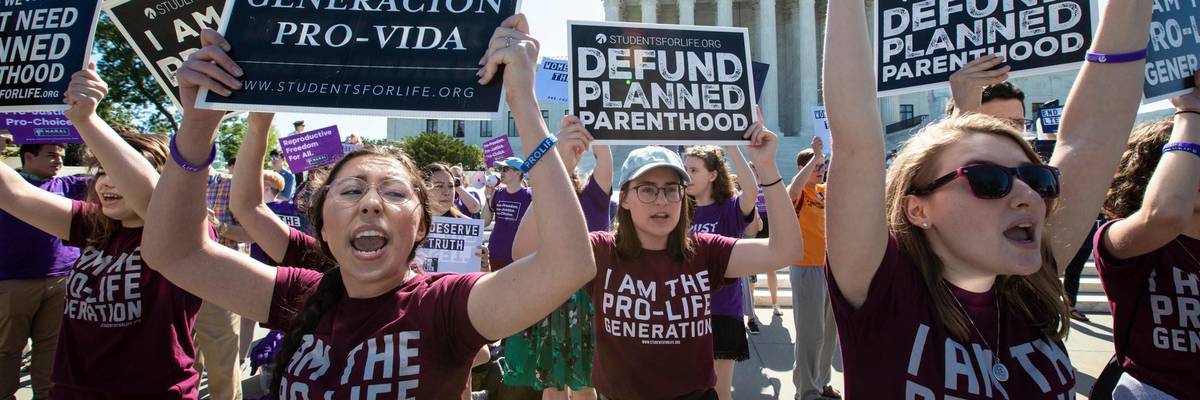

SUBSCRIBE TO OUR FREE NEWSLETTER
Daily news & progressive opinion—funded by the people, not the corporations—delivered straight to your inbox.
5
#000000
#FFFFFF
To donate by check, phone, or other method, see our More Ways to Give page.


Daily news & progressive opinion—funded by the people, not the corporations—delivered straight to your inbox.

Anti-abortion (in front) and abortion-rights (in back) advocates demonstrating in front of the Supreme Court in June. (Photo: J. Scott Applewhite/Associated Press)
This piece was originally published in The New York Times.
When the Supreme Court declined on Monday to hear cases brought by Louisiana and Kansas attempting to exclude Planned Parenthood and other abortion providers from their Medicaid programs, legal soothsayers were out in full force opining about what it means for the future of abortion rights under the newly constituted court.
The decision drew a dissent from three conservative justices, Clarence Thomas, Neil Gorsuch and Samuel Alito, who suggested that the court was ducking the cases because they involved Planned Parenthood and touched on abortion. But, intriguingly, the court's two other conservatives, Chief Justice John Roberts Jr. and the court's latest member, Brett Kavanaugh, sided with the court's liberals in rejecting the case.
What are we to make of it?
It's not easy to read the tea leaves here because the cases didn't pose a direct challenge to the constitutionality of abortion restrictions. Instead, they centered on whether those states could exclude Planned Parenthood from providing contraception and other health services in the Medicaid program. Those states object to Planned Parenthood providing access to abortion outside Medicaid, which does not cover the procedure. Had the court accepted the states' arguments, tens of thousands of indigent women could have lost the health care they receive from the group.
Read full article here.
Dear Common Dreams reader, The U.S. is on a fast track to authoritarianism like nothing I've ever seen. Meanwhile, corporate news outlets are utterly capitulating to Trump, twisting their coverage to avoid drawing his ire while lining up to stuff cash in his pockets. That's why I believe that Common Dreams is doing the best and most consequential reporting that we've ever done. Our small but mighty team is a progressive reporting powerhouse, covering the news every day that the corporate media never will. Our mission has always been simple: To inform. To inspire. And to ignite change for the common good. Now here's the key piece that I want all our readers to understand: None of this would be possible without your financial support. That's not just some fundraising cliche. It's the absolute and literal truth. We don't accept corporate advertising and never will. We don't have a paywall because we don't think people should be blocked from critical news based on their ability to pay. Everything we do is funded by the donations of readers like you. Will you donate now to help power the nonprofit, independent reporting of Common Dreams? Thank you for being a vital member of our community. Together, we can keep independent journalism alive when it’s needed most. - Craig Brown, Co-founder |
This piece was originally published in The New York Times.
When the Supreme Court declined on Monday to hear cases brought by Louisiana and Kansas attempting to exclude Planned Parenthood and other abortion providers from their Medicaid programs, legal soothsayers were out in full force opining about what it means for the future of abortion rights under the newly constituted court.
The decision drew a dissent from three conservative justices, Clarence Thomas, Neil Gorsuch and Samuel Alito, who suggested that the court was ducking the cases because they involved Planned Parenthood and touched on abortion. But, intriguingly, the court's two other conservatives, Chief Justice John Roberts Jr. and the court's latest member, Brett Kavanaugh, sided with the court's liberals in rejecting the case.
What are we to make of it?
It's not easy to read the tea leaves here because the cases didn't pose a direct challenge to the constitutionality of abortion restrictions. Instead, they centered on whether those states could exclude Planned Parenthood from providing contraception and other health services in the Medicaid program. Those states object to Planned Parenthood providing access to abortion outside Medicaid, which does not cover the procedure. Had the court accepted the states' arguments, tens of thousands of indigent women could have lost the health care they receive from the group.
Read full article here.
This piece was originally published in The New York Times.
When the Supreme Court declined on Monday to hear cases brought by Louisiana and Kansas attempting to exclude Planned Parenthood and other abortion providers from their Medicaid programs, legal soothsayers were out in full force opining about what it means for the future of abortion rights under the newly constituted court.
The decision drew a dissent from three conservative justices, Clarence Thomas, Neil Gorsuch and Samuel Alito, who suggested that the court was ducking the cases because they involved Planned Parenthood and touched on abortion. But, intriguingly, the court's two other conservatives, Chief Justice John Roberts Jr. and the court's latest member, Brett Kavanaugh, sided with the court's liberals in rejecting the case.
What are we to make of it?
It's not easy to read the tea leaves here because the cases didn't pose a direct challenge to the constitutionality of abortion restrictions. Instead, they centered on whether those states could exclude Planned Parenthood from providing contraception and other health services in the Medicaid program. Those states object to Planned Parenthood providing access to abortion outside Medicaid, which does not cover the procedure. Had the court accepted the states' arguments, tens of thousands of indigent women could have lost the health care they receive from the group.
Read full article here.